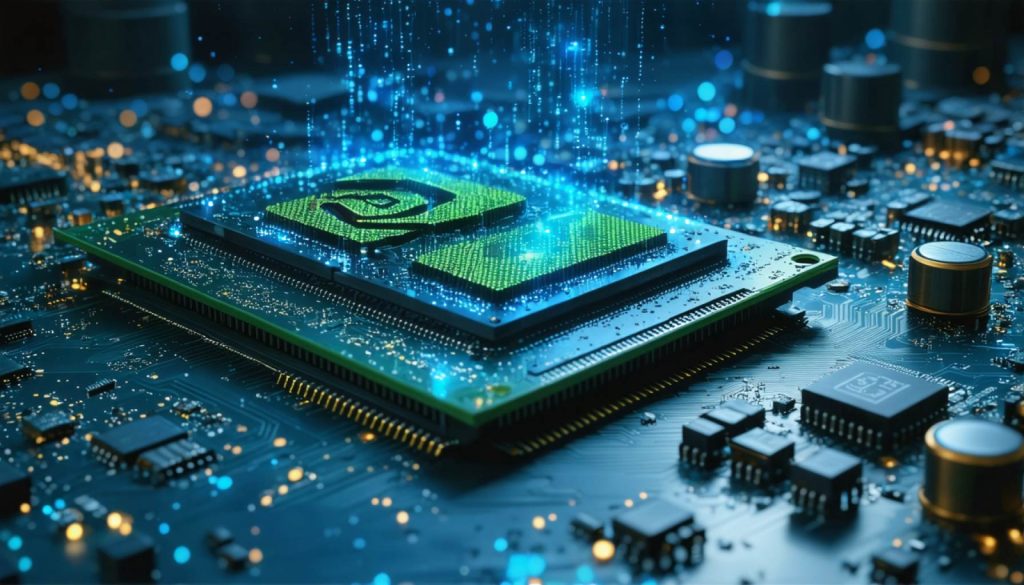
- AI is driving a major industrial revolution with Taiwan Semiconductor Manufacturing and Nvidia at the forefront.
- Taiwan Semiconductor produces 90% of the world’s AI processors, with sales rising 37% and earnings per share up 57% last quarter.
- Expectations are set for AI accelerator revenue to double by 2025 despite recent market fluctuations.
- Nvidia holds a 95% global market share for AI chips, with a 78% sales increase driven by demand for Blackwell AI processors.
- Predictions indicate AI could add $15.7 trillion to global GDP by 2030, surpassing the uncertainty of cryptocurrencies.
- Both companies not only benefit from but actively shape the AI landscape, offering tangible investment opportunities in a rapidly evolving market.
The world of artificial intelligence (AI) pulses with promise, inviting investors to glimpse what could be the most transformative industrial revolution yet. Amidst the backdrop of fluctuating cryptocurrency fortunes, tech stalwarts Taiwan Semiconductor Manufacturing and Nvidia emerge as essential architects of our AI-driven tomorrow.
Taiwan Semiconductor Manufacturing, the crown jewel of the semiconductor world, harnesses its colossal chip-making prowess to satisfy a surging demand largely fueled by AI. This titan doesn’t just ride the wave of technological enthusiasm; it propels it. Its innovative spirit crafts an astounding 90% of the world’s AI processors, situating the company as a crucial force in the dynamism of digital intelligence. In the last quarter alone, the corporation witnessed its sales soar by a remarkable 37%, hitting $26.9 billion, while its earnings per share leaped by 57%.
Emboldened by these staggering figures, Taiwan Semiconductor consolidates its future strategy. As its leader, C.C. Wei, anticipates, revenue from AI accelerators could double by 2025, illustrating that the AI surge is far from reaching its zenith. Despite recent market tremors that nudged its share price down by 15%, its price-to-earnings ratio provides a tempting opportunity for the discerning investor.
On a parallel path, Nvidia shines as a poet of processors—its chip designs infuse life into the AI dreams of nations and industries. Capturing an astonishing 95% share of the global AI chip market, Nvidia’s fiscal prowess was reflected in a staggering 78% rise in sales in the last quarter, rooted in unprecedented demand for its groundbreaking Blackwell AI processors. Reaching $11 billion in sales in just a quarter, these processors embody an ascent unmatched in Nvidia’s storied history.
As debate swirls around future data center investments and potential economic contractions, Nvidia stands resolute. The company’s leadership projects that the echoing impact of AI will only crescendo, with PwC predicting a monumental $15.7 trillion addition to the global GDP by AI by 2030.
In contrast to the nebulous realm of cryptocurrencies, where gains are often shadowed by uncertainty, the value proposition of towering tech entities like Taiwan Semiconductor and Nvidia resonates with solidity. They don’t merely ride the AI wave—they shape it, infusing tangible contributions to a reality where AI isn’t a distant frontier but a navigable world being actively defined.
As AI cements its role in our industrial evolution, these two giants offer investment grounded not in abstract promise but in action and achievement. The future may be unwritten, but for those charting a course with Taiwan Semiconductor and Nvidia, it’s bound to be crafted with precision, vision, and an unyielding drive toward an AI-enhanced future.
The AI Revolution: How Taiwan Semiconductor and Nvidia Are Shaping the Future
Understanding the Role of Taiwan Semiconductor and Nvidia in AI
Artificial intelligence is rapidly transforming industries around the globe, and two key players, Taiwan Semiconductor Manufacturing Company (TSMC) and Nvidia, are at the forefront of this evolution. With their significant contributions to semiconductor and AI technologies, these companies are not just adapting to the wave of AI advancements—they are leading it.
Taiwan Semiconductor Manufacturing Company (TSMC)
Market Position and Financial Performance
TSMC is renowned for its dominance in semiconductor manufacturing, producing an astounding 90% of the world’s AI processors. A key driver of this success is its cutting-edge technology and ability to scale production efficiently. Recently, its quarterly sales saw a 37% increase, amounting to $26.9 billion, while earnings per share rose by 57%.
Future Forecasts
Despite a 15% dip in share price influenced by market conditions, TSMC’s strategic focus on AI gives it a promising outlook. C.C. Wei, the CEO, anticipates that AI accelerator revenue could double by 2025. This optimism is grounded in TSMC’s continued innovation and strategic investments in AI technologies.
Real-World Use Cases
TSMC chips are integral to powering AI applications across industries, including autonomous vehicles, healthcare diagnostics, and smart consumer electronics. Their role in enhancing AI capabilities solidifies their market position.
Nvidia
Dominance in AI Chips
Nvidia holds an impressive 95% share of the AI chip market, largely due to the success of its Blackwell AI processors. Last quarter alone, Nvidia experienced a 78% surge in sales, reaching $11 billion—numbers that underscore the increasing demand for AI technologies.
Industry Impact and Predictions
With AI projected to add $15.7 trillion to global GDP by 2030, Nvidia is positioned to significantly benefit from this growth. The company’s continuous development of innovative AI solutions aligns with these optimistic industry forecasts.
Applications in Various Sectors
Nvidia’s processors are pivotal in AI-driven sectors such as data centers, gaming, and cloud computing. Their robust technology supports complex AI models that drive efficiency and innovation across different fields.
Pressing Questions About AI Investments in TSMC and Nvidia
1. Is Now a Good Time to Invest in TSMC and Nvidia?
Both companies show solid financial performance and strategic commitment to AI, making them attractive investment opportunities. However, potential investors should consider market volatility and conduct thorough analysis.
2. What are the Key Risks Associated with These Investments?
Market dependency on specific technology cycles and geopolitical tensions in semiconductor supply chains could impact these companies. Keeping informed about these external factors is crucial.
3. How Do These Companies Ensure Sustainable Growth?
Sustainability is a priority, with both TSMC and Nvidia investing in energy-efficient solutions and eco-friendly practices to minimize their environmental impact.
Actionable Recommendations for Investors and Enthusiasts
– Diversify Investments: While TSMC and Nvidia present compelling prospects, consider balancing portfolios with diverse tech investments to mitigate risks.
– Stay Updated: Regularly follow industry trends and company announcements to make informed decisions.
– Leverage AI Technologies: For businesses, integrating AI solutions from these companies could enhance operational efficiency and innovation.
For more information on similar topics, explore the official websites of TSMC and Nvidia.
—
By understanding the profound impact and future potential of AI technologies developed by these giants, individuals and investors can position themselves advantageously in this rapidly advancing technological landscape.



